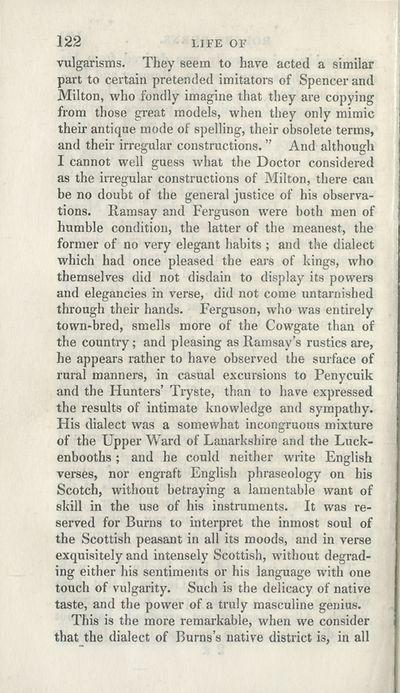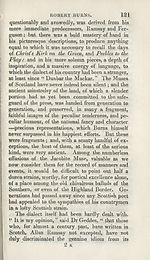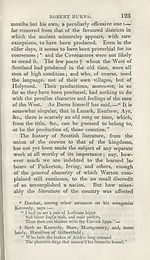Scotland/Scots > Life of Robert Burns
(132)
Download files
Complete book:
Individual page:
Thumbnail gallery: Grid view | List view

LIFE OF
122
vulgarisms. They seem to have acted a similar
part to certain pretended imitators of Spencer and
Milton, who fondly imagine that they are copying
from those great models, when they only mimic
their antique mode of spelling, their obsolete terms,
and their irregular constructions. ” And although
I cannot well guess what the Doctor considered
as the irregular constructions of Milton, there can
be no doubt of the general justice of his observa¬
tions. Ramsay and Ferguson were both men of
humble condition, the latter of the meanest, the
former of no very elegant habits ; and the dialect
which had once pleased the ears of kings, who
themselves did not disdain to display its powers
and elegancies in verse, did not come untarnished
through their hands. Ferguson, who was entirely
town-bred, smells more of the Cowgate than of
the country; and pleasing as Ramsay’s rustics are,
he appears rather to have observed the surface of
rural manners, in casual excursions to Penycuik
and the Plunters’ Tryste, than to have expressed
the results of intimate knowledge and sympathy.
His dialect was a somewhat incongruous mixture
of the Upper Ward of Lanarkshire and the Luck-
enbooths; and he could neither write English
verses, nor engraft English phraseology on his
Scotch, without betraying a lamentable want of
skill in the use of his instruments. It was re¬
served for Burns to interpret the inmost soul of
the Scottish peasant in all its moods, and in verse
exquisitely and intensely Scottish, without degrad¬
ing either his sentiments or his language with one
touch of vulgarity. Such is the delicacy of native
taste, and the power of a truly masculine genius.
This is the more remarkable, when we consider
that the dialect of Burns’s native district is, in all
122
vulgarisms. They seem to have acted a similar
part to certain pretended imitators of Spencer and
Milton, who fondly imagine that they are copying
from those great models, when they only mimic
their antique mode of spelling, their obsolete terms,
and their irregular constructions. ” And although
I cannot well guess what the Doctor considered
as the irregular constructions of Milton, there can
be no doubt of the general justice of his observa¬
tions. Ramsay and Ferguson were both men of
humble condition, the latter of the meanest, the
former of no very elegant habits ; and the dialect
which had once pleased the ears of kings, who
themselves did not disdain to display its powers
and elegancies in verse, did not come untarnished
through their hands. Ferguson, who was entirely
town-bred, smells more of the Cowgate than of
the country; and pleasing as Ramsay’s rustics are,
he appears rather to have observed the surface of
rural manners, in casual excursions to Penycuik
and the Plunters’ Tryste, than to have expressed
the results of intimate knowledge and sympathy.
His dialect was a somewhat incongruous mixture
of the Upper Ward of Lanarkshire and the Luck-
enbooths; and he could neither write English
verses, nor engraft English phraseology on his
Scotch, without betraying a lamentable want of
skill in the use of his instruments. It was re¬
served for Burns to interpret the inmost soul of
the Scottish peasant in all its moods, and in verse
exquisitely and intensely Scottish, without degrad¬
ing either his sentiments or his language with one
touch of vulgarity. Such is the delicacy of native
taste, and the power of a truly masculine genius.
This is the more remarkable, when we consider
that the dialect of Burns’s native district is, in all
Set display mode to:
![]() Universal Viewer |
Universal Viewer | ![]() Mirador |
Large image | Transcription
Mirador |
Large image | Transcription
| Antiquarian books of Scotland > Scotland/Scots > Life of Robert Burns > (132) |
|---|
| Permanent URL | https://digital.nls.uk/108247443 |
|---|
| Description | Thousands of printed books from the Antiquarian Books of Scotland collection which dates from 1641 to the 1980s. The collection consists of 14,800 books which were published in Scotland or have a Scottish connection, e.g. through the author, printer or owner. Subjects covered include sport, education, diseases, adventure, occupations, Jacobites, politics and religion. Among the 29 languages represented are English, Gaelic, Italian, French, Russian and Swedish. |
|---|

